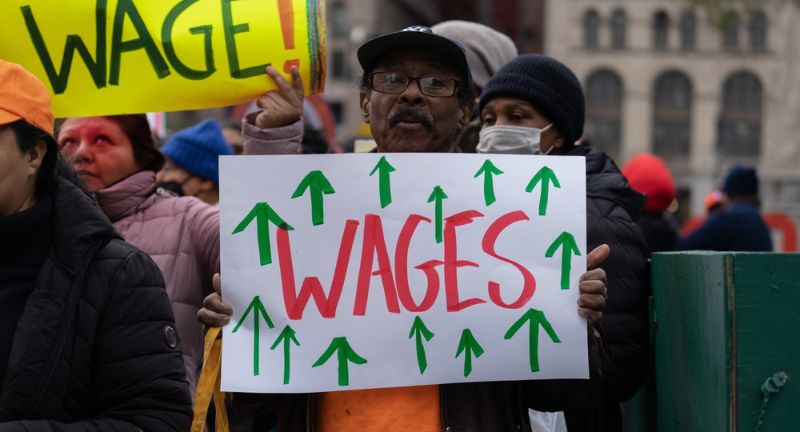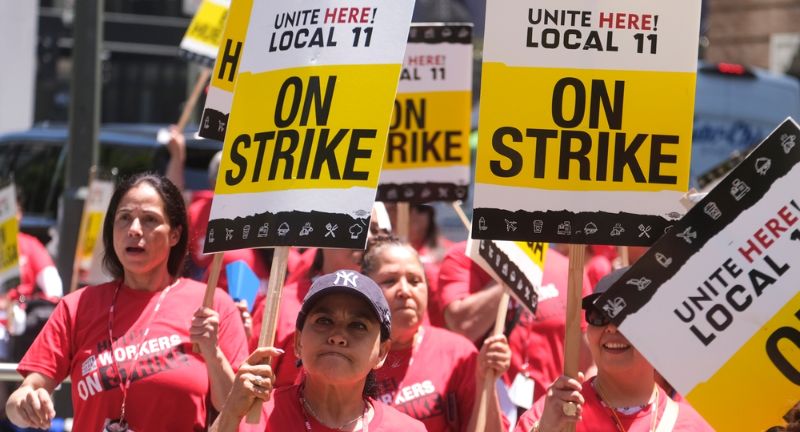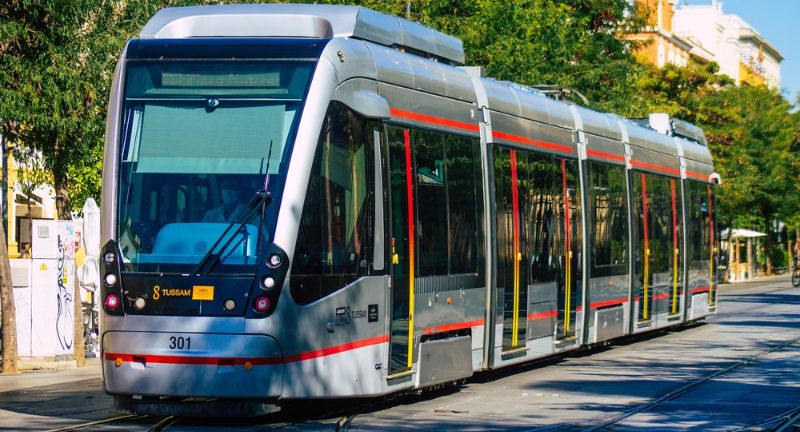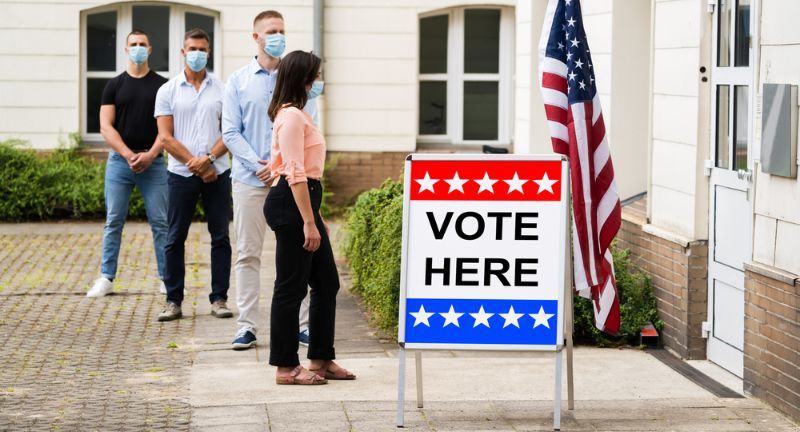NEWS
20 Policies Conservatives Support That Are Wrecking The Middle Class
Published
9 months agoon

Shutterstock
Conservative policies often masquerade as solutions for economic growth, but they consistently undermine the very foundation of the middle class. From slashing social programs to favoring corporate interests, these policies are systematically dismantling the financial stability of average Americans. The middle class, the backbone of our nation, is being sacrificed for the benefit of the wealthy elite. It’s time to expose how these 20 conservative policies are wrecking the lives of hard-working families across the country.
Tax Cuts for the Wealthy

Shutterstock
Conservative tax policies often prioritize cuts for the wealthiest individuals and corporations. These tax cuts can lead to significant revenue losses for the government, necessitating cuts in public services and benefits that many middle-class families rely on. As a result, the middle class may face higher taxes or reduced services, exacerbating economic inequality. This approach undermines the financial stability of the average household while disproportionately benefiting the affluent.
Reduced Funding for Public Education

Shutterstock
Conservative efforts to cut funding for public education have long-term negative effects on the middle class. Reduced funding can lead to larger class sizes, outdated materials, and fewer resources for students. Middle-class families may have to pay for private education or additional tutoring to compensate, putting a strain on their finances. Quality education is a cornerstone of economic mobility, and cutting funds undermines this critical pathway to success.
Opposition to Minimum Wage Increases

Shutterstock
Conservatives often oppose raising the minimum wage, arguing it could harm businesses. However, this stance ignores the benefits of increased wages for middle-class workers, including improved quality of life and economic security. Higher wages can boost consumer spending and stimulate economic growth. By opposing wage increases, conservatives hinder the financial progress of middle-class families who rely on these earnings to make ends meet.
Privatization of Social Security

Shutterstock
Proposals to privatize Social Security threaten the retirement security of the middle class. Privatization introduces market risks to retirement funds, potentially leading to significant losses for individuals. The stability and predictability of Social Security are crucial for middle-class retirees who depend on these benefits. Shifting to a privatized system could undermine their financial security and increase economic uncertainty in retirement.
Healthcare Reforms that Increase Costs

Shutterstock
Conservative healthcare reforms often focus on reducing government involvement, which can lead to higher costs for middle-class families. Policies that reduce subsidies or limit coverage options force families to pay more out-of-pocket for healthcare. This financial burden can be significant, especially for those with chronic conditions or large families. Ensuring affordable healthcare is vital for maintaining the economic stability of the middle class.
Cutting Unemployment Benefits

Shutterstock
Cuts to unemployment benefits disproportionately affect the middle class, particularly during economic downturns. These benefits are essential for individuals who lose their jobs, providing a temporary safety net. Reducing or eliminating these benefits forces families to deplete savings and increases financial stress. Supporting robust unemployment benefits is crucial for the economic resilience of middle-class workers.
Restricting Labor Union Power

Shutterstock
Conservative policies often seek to limit the power of labor unions, which can hurt middle-class workers. Unions play a crucial role in negotiating better wages, benefits, and working conditions. Weakening unions diminishes workers’ bargaining power, leading to lower wages and fewer protections. A strong labor movement is essential for ensuring fair treatment and economic security for middle-class workers.
Environmental Deregulation

Shutterstock
Environmental deregulation often benefits large corporations at the expense of middle-class communities. Deregulation can lead to increased pollution and environmental degradation, affecting public health and property values. Middle-class families bear the brunt of these negative impacts, facing higher healthcare costs and decreased quality of life. Protecting the environment is crucial for maintaining healthy and sustainable communities.
Weakening Consumer Protection

Shutterstock
Conservative efforts to weaken consumer protection laws can have detrimental effects on the middle class. These protections are designed to prevent predatory practices and ensure fair treatment in financial transactions. Weakening these laws leaves consumers vulnerable to scams, high fees, and unfair lending practices. Robust consumer protections are essential for safeguarding the financial well-being of middle-class families.
Reducing Access to Affordable Housing

Shutterstock
Policies that reduce access to affordable housing disproportionately impact the middle class. Without sufficient affordable housing, middle-class families may struggle to find suitable living arrangements within their budget. This can lead to increased financial strain and limit the ability to save for other needs. Ensuring access to affordable housing is crucial for the financial stability and well-being of middle-class families.
Undermining Public Transportation

Shutterstock
Conservative policies that undermine public transportation funding can hurt middle-class workers who rely on these services. Effective public transportation provides affordable and reliable access to jobs, education, and essential services. Reducing funding can lead to service cuts, higher fares, and decreased accessibility. Investing in public transportation is crucial for supporting the economic mobility of the middle class.
Blocking Paid Family Leave

Shutterstock
Opposition to paid family leave policies disproportionately impacts middle-class families who cannot afford to take unpaid leave. Paid family leave allows workers to take time off for medical or family reasons without financial hardship. Without this support, families face difficult choices between income and caregiving. Implementing paid family leave is essential for the economic and emotional well-being of middle-class families.
Restrictive Voter ID Laws

Shutterstock
Restrictive voter ID laws can disproportionately affect middle-class and lower-income voters by making it harder for them to participate in elections. These laws often require specific forms of identification that can be difficult or costly to obtain. This can lead to reduced political representation and influence for middle-class communities. Ensuring fair and accessible voting is essential for a representative democracy that serves all citizens.
Opposition to Net Neutrality

Shutterstock
Opposing net neutrality can lead to higher internet costs and reduced access for middle-class families. Net neutrality ensures that internet service providers treat all data equally, preventing them from charging more for certain services or slowing down others. Without these protections, middle-class consumers may face higher prices and less reliable internet access. Maintaining net neutrality is crucial for equitable access to information and opportunities.
Defunding Planned Parenthood

Shutterstock
Defunding Planned Parenthood limits access to essential health services for middle-class women and families. Planned Parenthood provides affordable reproductive health care, cancer screenings, and other vital services. Removing funding can lead to decreased access to these services, particularly in underserved areas. Supporting organizations like Planned Parenthood is crucial for ensuring comprehensive healthcare for all middle-class families.
Reducing Financial Aid for Higher Education

Shutterstock
Cuts to financial aid programs make higher education less accessible for middle-class students. Without sufficient financial aid, students may be forced to take on significant debt or forego college altogether. This limits their future earning potential and economic mobility. Investing in financial aid is essential for ensuring that middle-class students have the opportunity to pursue higher education and improve their economic prospects.
Supporting Predatory Lending Practices

Shutterstock
Conservative support for deregulating the financial industry can lead to predatory lending practices that harm middle-class borrowers. These practices include high-interest loans, excessive fees, and deceptive terms. Middle-class families caught in these traps can face financial ruin and long-term debt. Strong financial regulations are necessary to protect consumers from exploitative lending practices.
Weakening Workplace Safety Regulations

Shutterstock
Efforts to weaken workplace safety regulations can put middle-class workers at risk. Safety regulations are designed to protect employees from hazardous conditions and prevent workplace injuries. Reducing these protections can lead to more accidents and injuries, resulting in higher medical costs and lost income for workers. Ensuring robust workplace safety standards is essential for the health and financial security of the middle class.
Blocking Affordable Childcare Initiatives

Shutterstock
Blocking initiatives to provide affordable childcare places a significant burden on middle-class families. Without access to affordable childcare, parents may have to reduce work hours or leave the workforce entirely, impacting household income. Affordable childcare is crucial for enabling parents to work and support their families financially. Investing in childcare solutions supports the economic stability and growth of middle-class families.
Restricting Access to Food Assistance Programs

Shutterstock
Restricting access to food assistance programs can increase food insecurity among middle-class families. These programs provide vital support for families struggling to afford nutritious meals. Limiting access forces families to choose between food and other essential expenses, leading to financial strain and poor health outcomes. Ensuring robust food assistance programs is essential for the well-being of middle-class families.
Limiting Broadband Access

Shutterstock
Conservative opposition to expanding broadband access can hinder economic opportunities for middle-class families. Reliable internet access is essential for education, job opportunities, and accessing essential services. Without it, families are at a disadvantage in a digital world. Investing in broadband infrastructure is crucial for ensuring that all middle-class families can participate fully in the modern economy.
Conclusion

Shutterstock
The policies discussed here illustrate how conservative measures often negatively impact the middle class. By prioritizing tax cuts for the wealthy, reducing access to essential services, and opposing initiatives that support economic mobility, these policies create barriers for middle-class families. Addressing these issues requires a shift toward policies that genuinely support the middle class and promote economic equity. It’s time for policymakers to prioritize the needs of the many over the interests of the few.
Related Topics:

More From Financially+
-


25 U.S. Cities Perfect for Car-Free Living
-


25 Expenses People Outgrow As They Age
-


These Beloved American Foods Are Banned Around the World
-


25 Retirement Spots for Those Who Love the Great Outdoors
-


26 Splurge Worthy Items That Are Truly Worth Every Penny
-


Indestructible Rides: The Most Reliable Cars That Last a Lifetime
-


15 Supercars That Redefine Speed and Power
-


21 Relationship Blunders Women Make That Drive Mature Men Away
-


25 Ideal Remote Careers for Baby Boomers